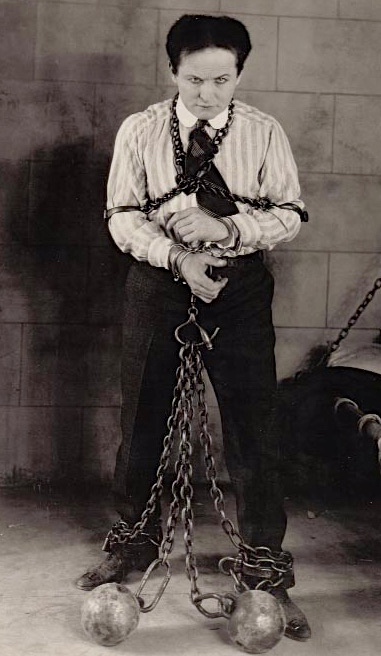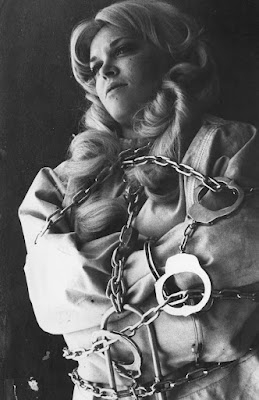During his introduction to the world premiere of TCM's restoration of Houdini's The Grim Game last Sunday, host Ben Mankiewicz commented on how he'd always heard Houdini was a bad actor. He then said he didn't understand this, because that is clearly not the case in the film we were all about to see -- a film that had remained unseen by the public for more than a half century. When the 71 minute movie concluded, I saw he was right. Houdini in The Grim Game is extraordinary in all regards. Here we finally see the Houdini the world knew, loved, and rooted for again and again. Houdini is a superstar in The Grim Game, which is perfectly tailored to showcase his talents and plucky personality. Yes, it's just as good as has always been rumored. I think I know why Houdini works so well in this particular film, but I'll get to that a little later.
At this point, I don't think I need to retell the story of how The Grim Game found its way to Hollywood and the TCM Classic Film Festival. It's enough to say that the world of magic and silent movie buffs turned out in force to see a film that most thought they might never see. The TCM festival scheduled the movie as their closing night event at Grauman's Egyptian Theater, Hollywood's oldest movie palace. Hours before the screening, the courtyard started filling with people, all hoping to get a seat. While the early word for non-festival attendees was that "it didn't look good," I heard everyone who tried was ultimately able to get inside. The 616 seat theater was packed when the show began at 8:30 PM.
 |
| With the sons of Grim Game director Irvin Willat. |
Ben Mankiewicz opened the show with his introductory remarks and a message from TCM's Robert Osborne, who couldn't attend the festival this year. He then introduced Dorothy Dietrich and Dick Brookz of the Houdini Museum in Scranton, who are credited as consultants on the restoration. Dorothy and Dick did a short Q&A with Mankiewicz, and then performed a magic trick using a vest once owned by Houdini. Dorothy teared up and received a nice ovation when she thanked TCM for all they had done, saying that she had been "waiting for this moment all of my life." A lot of us in the theater could relate to that.
Restoration Producer Rick Schmidlin then took the stage and explained how the film was acquired from collector Larry Weeks, and exactly what the restorationists had to work with. Mankiewicz then introduced composer Brane Živkovic, who created a new original score for the film to be performed live by musicians: Aimee Kreston (violin), Simone Vitrucci (cello), Joshua Ranz (clarinet), and Susan Svrcek (piano).
It was then time for the movie (projected digitally), and when Houdini made his beautifully teased out first appearance on-screen, there was a burst of applause!
The Grim Game is easily the best written, best directed, best shot, best acted, and best conceived Houdini movie by far. It's clever, fun, funny at times, and the escapes are simply breathtaking! Director Irvin Willat also knows how to play on audience expectations. When Houdini is confined in his jail cell, the director gives us a magnificent slow reveal of the iconically chained Houdini framed in the cell doorway. It's a perfect fusion of Houdini and cinema, and this amazing moment, conceived and shot 96 years ago, brought down the house in 2015. So too did the suspended straitjacket escape (just the appearance of the straitjacket brought applause), the jail escape, the bear trap, and the famous plane crash, which is more complete and much clearer that what has been available (you can see the plane wings shatter). There was sustained applause and laughter throughout the movie (side characters have some great comedic bits), and the movie received an ovation that lasted throughout the end credits, where I was honored to see my own name and Wild About Harry listed among the Thanks.
Afterwards, a group of us went back to the Magic Castle, where librarian Lisa Cousins reserved us a private room to discuss the momentous magic history we had just witnessed.
So why is The Grim Game so much more effective than Houdini's other films?
Apart from being just a better made movie overall, I believe one of the key reasons is The Grim Game is the only one of Houdini's films in which he plays an ordinary man and, basically, himself. In his other films, he is some version of a cliche movie hero: a millionaire inventor, a secret agent, or a man from beyond. Here he is just Harvey Hanford, a working reporter in a realistic urban setting. He's an underdog and an outsider, banned from his wealthy uncle's estate and teased by his office co-workers. But he is an optimist with an infectious grin, who just happens to possess an extraordinary ability to escape from any restraint the modern world throws on him. He is the man who cannot be held back. Harvey is the essence of Houdini, and Houdini is in his element playing the part. I sensed the audience at the Egyptian completely embraced the character, as well as delighting in the overall in-joke of the film -- that Harvey is being played by the real Harry Houdini! Ordinary man and superman in one, The Grim Game provides a quintessential Houdini experience.
Now, back to the acting. I believe Houdini became a worse actor as his movie career went along and he started to "study" the craft. He studied himself stiff. I've always thought his best performance was in his first film, The Master Mystery, when he didn't know better. He was loose and natural (apart from the love scenes). What's wonderful about The Grim Game is that he still has all that same early looseness, but with a bigger budget and better photography. There are no prolonged love scenes to strain him, and the film's plot is so modern he's never backed into a melodramatic corner. Also, when Harvey is planting "circumstantial evidence" against himself, Houdini has to act as if he's acting. He's actually giving a subtle comedic performance here, and he nails it! (Recall that he and Bess did a comedy act, The Rahners, early in their careers.) I believe my first wild-eyed words after the screening were, "The days of saying Houdini was a bad actor are OVER!"
Okay, I know what you are thinking. Of course I would give this a rave review -- I'm wild about Harry! True. There was no way I was not going to love this movie after waiting 40 years for it. But to show love is not completely blind, I will tell you the movie is not perfect. The lengthy set-up of both Harvey's plan and the three villains plotting behind his back drags somewhat, and it's all a little confusing. The beautiful Ann Forest is under used in a somewhat thankless role. And there are key moments that are not played up as well cinematically as they could be -- but you do have to remind yourself it is a 96-year-old movie.
The new score by Brane Živkovic might be the most controversial aspect of the restoration. Make no mistake, his music is beautiful, and it works incredibly well in places. But this is Živkovic's first score for a movie, a specialized skill, and he makes a few unconventional choices for a silent film, such as occasionally using no music at all. The decision to not score the jail cell shackle escape was a point of discussion after the screening. I personally liked the choice to let the escape play in total silence. I thought it created tension, almost like a silent drum roll. But others felt thrown. Also, by the end of the film, his four compositions were starting to feel repetitive. But I was happy and relieved that he created a whole new piece for the final plane chase and crash. Still, I'm hoping TCM allows a little more work on the score -- perhaps having Živkovic compose a few new pieces and bringing in a music editor -- before the movie hits the TCM channel.
A few other notes of interest: The movie appears to be set in New York, even though it was shot entirely in Los Angeles. Check out the map on the wall of the Daily Call office and the license plates on the cars. The movie might still be missing a scene in which Houdini/Harvey scales a high wall of an insane asylum. There are photos of this scripted scene, but it is not in this print. The restored print still shows some of the wear and tear of the original negative, including scenes in which we can see the beginnings of nitrate decomposition. This shows that The Grim Game was in real danger of being lost forever.
The Grim Game was made for an audience who knew and loved Houdini. But that is still the case today. In fact, Houdini might actually be more famous today than he was even in his own lifetime. The Grim Game didn't have a premiere in 1919. But it sure did last Sunday night, and Houdini brought cheers from a packed house 87 years after his death. Houdini became the Hollywood star he always expected himself to be on Sunday, and one can't help get the spooky feeling that Houdini himself is somehow behind this magical resurrection.
A very big THANK YOU to Rick Schmidlin and Charles Tabesh of TCM who provided me with tickets to the premiere and the Houdini experience of a lifetime. Also thanks to Rory Flynn and Patrick Culliton for their extreme generosity; Lisa Cousins for keeping me calm in the final moments as we waited for the theater doors to open; and Arthur Moses for providing all us "Houdini Nuts" with a wonderful Grim Game gift bag. And, of course, to Dorothy Dietrich and Dick Brookz for making all this happen in the first place.
Related:
- Photos from The Grim Game premiere in Hollywood
- Rick Schmidlin (Part I): Finding The Grim Game
- Rick Schmidlin (Part II): Saving The Grim Game
















































